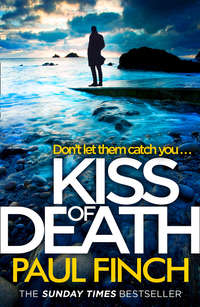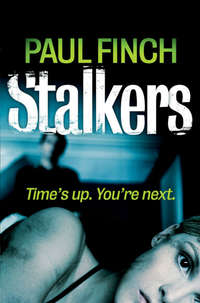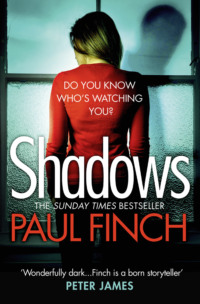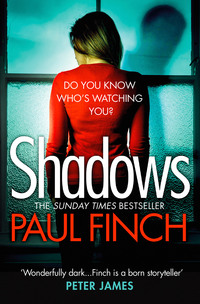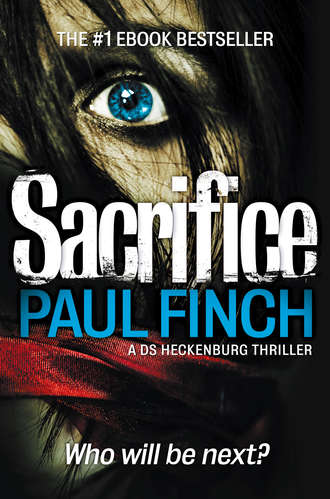
Полная версия
Sacrifice

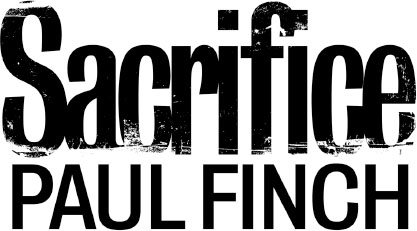

Copyright
Published by Avon an imprint of
HarperCollinsPublishers Ltd
1 London Bridge Street,
London SE1 9GF
www.harpercollins.co.uk
First published in Great Britain by HarperCollinsPublishers 2013
Copyright © Paul Finch 2013
Cover photographs © Arcangel & Roberto Pastrovicchio
Cover design © Henry Steadman 2013
Paul Finch asserts the moral right to be identified as the author of this work.
A catalogue copy of this book is available from the British Library.
This novel is entirely a work of fiction. The names, characters and incidents portrayed in it are the work of the author’s imagination. Any resemblance to actual persons, living or dead, events or localities is entirely coincidental.
All rights reserved under International and Pan-American Copyright Conventions. By payment of the required fees, you have been granted the non-exclusive, non-transferable right to access and read the text of this e-book on screen. No part of this text may be reproduced, transmitted, down-loaded, decompiled, reverse engineered, or stored in or introduced into any information storage and retrieval system, in any form or by any means, whether electronic or mechanical, now known or hereinafter invented, without the express written permission of HarperCollins.
Source ISBN: 9780007492312
Ebook Edition ISBN: 9780007492329
Version: 2017-11-14
Dedication
For my lovely wife, Catherine, whose selfless and unswerving support has been the bedrock on which I’ve built my career
Contents
Cover
Title Page
Copyright
Dedication
Chapter 1
Chapter 2
Chapter 3
Chapter 4
Chapter 5
Chapter 6
Chapter 7
Chapter 8
Chapter 9
Chapter 10
Chapter 11
Chapter 12
Chapter 13
Chapter 14
Chapter 15
Chapter 16
Chapter 17
Chapter 18
Chapter 19
Chapter 20
Chapter 21
Chapter 22
Chapter 23
Chapter 24
Chapter 25
Chapter 26
Chapter 27
Chapter 28
Chapter 29
Chapter 30
Chapter 31
Chapter 32
Chapter 33
Chapter 34
Chapter 35
Chapter 36
Chapter 37
Chapter 38
Chapter 39
Chapter 40
Chapter 41
Chapter 42
Chapter 43
Chapter 44
Chapter 45
Chapter 46
Chapter 47
Chapter 48
Chapter 49
Acknowledgements
About the Author
By the Same Author
About the Publisher
Chapter 1
The whole of Holbeck should be bombed.
That was Alan Ernshaw’s view. Okay, he was a relatively new police officer – just ten months in the job – so if anyone overheard him make such a politically incorrect statement and complained, he’d have an excuse. But the gaffers still wouldn’t be impressed. Holbeck, the old warehouse district located just south of Leeds city centre, might well consist mainly of buildings that were now empty shells, its Victorian terraced housing might now mostly be derelict, the few parts of it that were inhabited reduced to grotty concrete cul-de-sacs strewn with litter and covered in graffiti, but policemen didn’t take these sorts of things personally anymore. Or at least, they weren’t supposed to.
Ernshaw yawned and scratched the dried razor-cut on his otherwise smoothly shaven jaw.
Radio static crackled. ‘1762 from Three?’
Ernshaw yawned again. ‘Go ahead.’
‘What are you and Keith doing, over?’
‘Well we’re not sitting down for a turkey dinner, put it that way.’
‘Join the club. Listen, if you’ve nothing else on, can you get over to Kemp’s Mill on Franklyn Road?’
Ernshaw, who was from Harrogate, some fifteen miles to the north, and still didn’t completely know his way around West Yorkshire’s sprawling capital city, glanced to his right, where PC Keith Rodwell slouched behind the steering wheel.
Rodwell, a heavy-jowled veteran of twenty years, nodded. ‘ETA … three.’
‘Yeah, three minutes, over,’ Ernshaw said into his radio.
‘Thanks for that.’
‘What’s the job?’
‘It’s a bit of an odd one actually. Anonymous phone call says we’ll find something interesting there.’
Rodwell didn’t comment, just swung the van into a three-point turn.
‘Nothing more?’ Ernshaw asked, puzzled.
‘Like I say, it’s an odd one. Came from a call-box in the city centre. No names, no further details.’
‘Sounds like a ball-acher, but hey, we’ve nothing else to do this Christmas morning.’
‘Much appreciated, over.’
It wasn’t just Christmas morning; it was a snowy Christmas morning. Even Holbeck looked picture-postcard perfect as they cruised along its narrow, silent streets. The rotted facades and rusted hulks of abandoned vehicles lay half-buried under deep, creamy pillows. Spears of ice hung glinting over gaping windows and bashed-in doors. The fresh layer muffling the roads and pavements was pristine, only occasionally marked by the grooves of tyres. There was almost no traffic and even fewer pedestrians, but it wasn’t nine o’clock yet, and at that time on December 25 only fools like Ernshaw and Rodwell were likely to be up and about.
Or so they’d assumed.
‘Something interesting …’ Ernshaw mused. ‘What do you think?’
Rodwell shrugged. He spoke in monosyllables at the best of times, and as he was now deep in thought there wasn’t much chance even of that.
‘Bunch of druggies or something?’ Ernshaw added. ‘Squatting? If that’s it they’ll all be dead by now. Must’ve been minus-ten last night, easily.’
Again, Rodwell shrugged.
Kemp’s was a former flax-spinning mill, but it had been closed now for nearly two decades and was a forlorn reminder of prosperous times past. Its tall octagonal chimney was still intact, the square windows arrayed in uniform rows across its dingy frontage were largely unbroken, and most of its ground-floor entrances were supposedly chained shut, but, like so many of the derelict buildings around here, it wouldn’t be difficult for determined intruders to force entry.
Snow crunched under their tyres as they slid to a halt on the mill’s southward-facing lot. The gaunt structure loomed over them against the white winter sky. The red bricks with which it had been constructed were hidden beneath soot so thick it had become scabrous. Those pipes and gutterings that hadn’t already collapsed sagged beneath alpine overhangs of snow. At first glance there was no sign of life, but the place was enormous; not just a central block, which itself might have housed a thousand workers, but also all kinds of annexes and outbuildings. As the van eased forward at a snail’s pace, it dawned on Ernshaw how long it might take them to locate ‘something interesting’ here.
He put his radio to his mouth. ‘1762 to Three?’
‘Go ahead, Alan.’
‘We’re at Franklyn Road now. Everything looks okay so far. Any further on the complainant, over?’
‘That’s negative, Alan. Could be some prat with nothing better to do, but probably best to check it out, over.’
‘Received,’ he said, adding under his breath: ‘Might take a while, mind.’
They drove in a wide circle around the aged edifice, their tyres sliding as they hit patches of sheet-ice. Ernshaw wound his window down. It was bitterly cold outside – the snow was still dry and crisp as powder – but even if they didn’t see anything untoward, it was possible they might hear it.
That they didn’t was vaguely disconcerting.
Christmas morning ought to be deeply quiet, restful, hushed by the freshly fallen snow, yet the silence around Kemp’s Mill was somehow uncanny; it had a brittle edge, as if it could shatter at any moment.
They rounded corner after corner, gazing up sheer faces of windows and bricks, networks of ancient piping, and hanging, rusted fire-escapes. The van’s wheels constantly skidded, dirty slush flying out behind. They trundled through an access-passage connecting with a row of empty garages, the corrugated plastic roof of which had fallen through after years of decay. On the other side of this they spotted an entrance.
Rodwell applied the brakes gently, but the van still skated several yards before coming to rest.
What looked like a service doorway was set into a recess at the top of three wide steps. There was no sign of the door itself – possibly it lay under the snow, but from the state of the doorjamb, which had perished to soggy splinters, this entry had been forced a long time ago. A pitch-black interior lay beyond it.
‘2376 to Three?’ Rodwell told his radio.
‘Go ahead, Keith.’
‘Yeah, we’re still at Kemp’s Mill. Evidence of a break, over.’
‘Do you want some help?’
‘That’s negative at present. Looks like an old one.’
They climbed out, gloving up and zipping their padded anoraks. Ernshaw adjusted his hat while Rodwell locked the vehicle. They ventured up the steps, the blackness inside retreating under the intense beams of their torches. At the top, Ernshaw thought he heard something – laughter maybe, but it was very distant and very brief. He glanced at Rodwell, whose dour, pitted face registered that he’d heard nothing. Ernshaw was so unsure himself that he declined to mention it. He glanced behind them. This particular section of the property was enclosed by a high wall. The van was parked close alongside it, the entrance to the garage-passage just at its rear. Aside from the tracks the vehicle itself had made on entering the yard, the snowfall lay unbroken. Of course, flakes had been falling heavily until about two hours ago, so this didn’t necessarily mean that no one had been here during the night.
They entered side-by-side, torchlight spearing ahead, and were immediately faced by three options: directly in front, a switchback stair ascended into opaque blackness; on the right, a passage led off down a long gallery zebra-striped by smudges of light intruding through the ground level windows; on the left lay a wide open area, presumably one of the old workshops. They ventured this way first, their torch-beams crisscrossing, revealing bare brick walls and a high plaster ceiling, much of which had rotted, exposing bone-like girders. Shredded cables hung like jungle creeper. The asphalt floor was scattered with planks and fragments of tiles. Here and there, the corroded stubs of machine fittings jutted dangerously upward. Despite the intense cold, there was a sour taint to the air, like mildew. The scuffling of their feet echoed through the vast building’s distant reaches.
They halted to listen, hearing nothing.
‘This is a wild goose chase,’ Ernshaw finally said, his words smoking. ‘You realise that, don’t you?’
‘Probably,’ Rodwell replied, shining his torch into every corner. From the moment they’d received the call, Rodwell had seemed a little graver of purpose than usual, which was intriguing to Ernshaw. Keith Rodwell had been a copper for so long that he generally sized situations up instinctually. The way he was behaving now suggested that he genuinely believed something untoward was going on here.
‘Okay, I give up,’ Ernshaw said. ‘What do you think we’re going to find?’
‘Keep it down. Even if this is someone taking the piss, let’s catch ’em at it.’
‘Keith … it’s Christmas morning. Why would someone …’
‘Shhh!’
But Ernshaw had also just heard the long, low creak from overhead. They regarded each other in the gloom, ears pricked.
‘Take the front stair,’ Rodwell said quietly, edging across the workshop. ‘I’ll go around the back … see if I can find another way up.’
Ernshaw retreated to the door they’d come in through. He glanced at the van out in the yard; as before, there was no sign of movement. He started to ascend, attempting to do it stealthily though his footsteps rang up the stairwell ahead of him. The first floor he came to comprised another huge workshop. Not all the windows up here were boarded, though their glass was so grimy that only a paltry winter light filtered through. Even so, it was enough to hint at an immense hangar-like space ranging far across the building, filled with stacked crates and workbenches, forested by steel pillars.
Ernshaw hesitated, gripping the hilt of his baton. This time last year he’d been an innocent young student at the University of Hull, so he had no trouble admitting to himself that, while it was bad enough being made to work on Christmas Day – only the older, married guys tended to be spared that pain-in-the-arse duty – it was even worse having to spend it trawling through the guts of an eerie, frozen ruin like this.
A loud crackle from his radio made him jump.
The voice of Comms boomed out as it dispatched messages to patrols elsewhere on the subdivision. Irritated, he turned the volume down.
Ernshaw advanced as his eyes adjusted to the half-light. Directly ahead, about forty yards away, a doorway opened into what looked like an antechamber. For some reason, the rear brick wall of that chamber was lit by a greenish glow.
Green?
A coloured candle, maybe? A paper lantern?
Ernshaw halted as a figure flitted past the doorway on the other side.
‘Hey,’ he said under his breath. Then louder: ‘Hey!’
He dashed forward, with baton drawn and angled across his shoulder.
When he entered the chamber, nobody was there, but he saw that the odd-coloured light had been caused by a sheet of mouldy green canvas fastened over a window. A stairway – an indoor fire-escape, all rust and riveted steel – dropped down through a trapdoor; while a secondary stair rose up to the next level, though this was very narrow, scarcely broad enough for an average-sized man to climb it without turning sideways. He peered up, spying a ray of feeble daylight at the top. When he listened, he heard nothing, though it wasn’t difficult to imagine that someone was lurking up there, listening back.
‘Alan?’ someone asked.
Half-shouting, Ernshaw spun around.
Rodwell gazed at him from the trapdoor, in particular at his drawn baton.
‘Have you …?’ Ernshaw glanced back up the stair, listening intently. ‘Have you been up here once? I mean, have you been up already and gone back down for any reason?’ Rodwell shook his head as he rose fully into view. ‘Thought I saw someone, but …’ The more Ernshaw considered it, the less substantial that ‘figure’ seemed. A shadow maybe, cast by his torch? ‘Could’ve been mistaken, I suppose …’
Rodwell also glanced up the next stair. Without speaking, he ascended it, just about able to slide his big body between its encroaching walls.
Ernshaw followed, discomforted by the tightness of the passage. The floor at the top of this had been partitioned into small rooms and connecting corridors. Even fewer of the windows on this level were boarded, but there were less of them, so a sepulchral gloom pervaded.
Before they commenced exploring, Rodwell lifted a dust-caked Venetian blind and peered down into the yard below. It had occurred to them both, somewhat belatedly, that if this was some daft but elaborate ruse to create a diversion by which to steal a police vehicle, they’d be left with an omelette-sized egg on their faces. However, the van sat unmolested; the snow around it unmarked. From this height, they could see further afield into adjacent streets, or what remained of them. Most of the rows of terraced housing on the south side of Kemp’s Mill had been demolished, but even with the recent snowfall, the parallel outlines of their old foundations were still visible.
There was no sign of anyone around. The nearest habitations were two blocks of 1970s flats about three hundred yards away, beyond a mountain of snow-covered scrap; only one or two lights – the garish neon of Christmas decorations – twinkled from their windows.
‘2376 from Three?’ the voice of Comms crackled from Rodwell’s radio.
‘Go ahead,’ he said, dropping the blind back into place.
‘Anything from Franklyn Road yet?’
‘No offences revealed at this stage. Still searching, over.’
‘Message from Sergeant Roebuck, Keith. Don’t waste too much time there. If it’s just some kids messing around, leave it. There are other jobs piling up.’
‘Roger, received.’
‘That it, then?’ Ernshaw asked hopefully.
‘No,’ Rodwell replied.
They ventured along a central passage, peeking around the first door they came to, seeing what had presumably once been an office. In the middle of it, weak daylight illuminated a single filing cabinet from which a ton of paperwork had overflowed. Ernshaw entered, scooping up some of the documents: work rosters yellowed by age; dog-eared time-and-motion sheets. He tossed them away, moving through the next doorway into another identical office. Sometime in the past, vandals had scribbled slogans all over the walls in this one.
‘Kids have been in here, alright,’ he said. ‘Dirty little buggers too. Seen this … “My little sister gave me my first blowjob. She’ll do you too for a fiver.” There’s even a fucking phone number. “Every day I wank into my mum’s knickers – now she’s pregnant again. Oh shit.”’ Getting no response, he turned.
Rodwell had not come into the room with him.
Ernshaw went back to the door and glanced into the office with the filing cabinet; Rodwell wasn’t in there either.
‘Keith?’ he said.
A footfall sounded behind him. He whirled around – to find that he was still alone. But on the far side of the room another door stood ajar.
Hadn’t it been closed previously?
Ernshaw approached it, suddenly suspecting that someone was in the next room. Baton drawn again, he yanked the door open – entering yet another deserted corridor, the contents of more gutted offices spilling into it from adjoining doorways.
‘Keith?’
Still there was no reply.
Ernshaw proceeded forward. At the extreme end there was another stairway, but when he reached this, it was only short and led up to a closed door, beyond which a crack of bright daylight was visible.
‘Keith? You up there, mate?’
Again, nothing.
He ascended slowly, body half-turned so that he could watch both in front and behind. At the top, the door swung open easily and Ernshaw entered the most spacious office he’d seen to date – a good forty foot by thirty – the sort of palatial residence an MD might once have inhabited. It possessed several large windows, all intact, none covered by planking or sheets of green canvas. The walls were even papered, though the floor contained loose boards, several of which had warped and sprung. There was no furniture; just a scattering of broken bricks and, in one corner, rather curiously, a wheelbarrow rimmed with hardened cement, a pick and sledge-hammer standing against it.
But none of this captured Ernshaw’s attention as much as the strange object on the farthest side of the room.
He walked forward.
It appeared to be a section of new wall; a seven-foot-wide rectangle rising almost floor to ceiling. The paper and plaster had recently been torn away, and the ancient stonework beneath demolished; new, yellowish bricks had been mortared into the resulting cavity. But what really caught his eye hung in the middle of this: a sheet of white paper with a message emblazoned on it in startling crimson. The paper was fresh and new; when Ernshaw took it from the wall it had been fixed there with Blu-Tack, which proved to be soft and obviously new as well.
The message had been printed by a modern desk-jet of some sort. It read:
Ho Ho Ho
Ernshaw’s short-cropped hair prickled. This sign could easily be more empty-headed idiocy from the local scrotes. But there was something about it – probably the fact that it was clearly a recent addition to this neglected pile – that made him think it might be significant. He stepped backward, examining the wall again. It had definitely been constructed more recently than the rest of the building. At its base, two lumps of tapered black wood protruded through a tiny gap under the bricks; some builder’s device, no doubt, to keep the whole thing level.
A hand tapped his shoulder.
Ernshaw spun around like a dervish. ‘Fuck me!’ he hissed.
‘What’s this?’ Rodwell asked.
‘Will you stop sneaking up on people!’ Ernshaw handed him the notice. ‘Dunno. Found it pinned to the wall.’
Rodwell stared at the wall first. ‘This brickwork’s new.’
‘That’s what I thought. Well … they’ll have done all sorts of jobs over the years, to keep the place serviceable, won’t they?’
‘Not in the last twenty.’ Rodwell glanced at the notice, then back at the wall again. ‘This is a chimney breast. Or it was. Probably connected to one of the outer flues.’
‘Okay, it’s a chimney,’ Ernshaw said. ‘Bricking up an old chimney isn’t much of a criminal offence these days, is it?’
Rodwell read the notice a second time.
Ho Ho Ho
‘Jesus … Christ,’ he breathed slowly. ‘Jesus Christ almighty!’
Moving faster than Ernshaw had ever seen him, Rodwell threw the paper aside and dropped to one knee to examine the two wooden stubs protruding below the brickwork. Ernshaw leaned down to look as well – and suddenly realised what he was actually seeing; the scuffed toes of a pair of boots.
Rodwell grabbed the pick and Ernshaw the hammer.
They went at the new wall as hard as they could, and at first it resisted their efforts – but they pounded fiercely, Rodwell stopping only to call for supervision and an ambulance, Ernshaw to unzip his anorak and throw off his hat. After several minutes grunting and sweating, mortar was bursting out with every impact – then they were loosening bricks, extricating them with their fingers, guarding their eyes against flying chips. Piece by piece, the wall came down, gradually exposing what stood behind it – though the aroma hit them first.
Ernshaw gagged, clamping a hand to his nose and mouth. Rodwell worked all the harder, smashing away the last vestiges of brickwork.
They stood back panting, wafting at the dust, retching at the stink.
‘Good God!’ Rodwell said as he focused on what they’d uncovered.
Though it stood upright, this was only because it had been suspended by the wrists from two manacles fixed above its head. It had reached that stage of early putrefaction where it could either have been a shrivelled corpse or a wax dummy, its complexion somewhere between sickly yellow and maggoty green. It had once been an elderly man – that much was evident from the scraggly white beard on its skullish jaw, plus it was bone-thin, an impression only enhanced by its baggy, extremely dirty garb. This consisted of a red tunic hanging in foul-smelling folds, trimmed with dirt-grey fur, and red pantaloons, the front of them thick with frozen urine, their cuffs tucked into a pair of oversized wellingtons.


